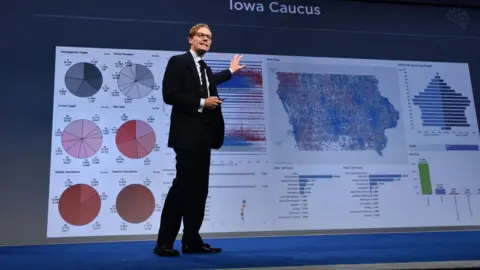Facebook and Trump data firm accused of 'misleading' MPs
 Getty Images
Getty ImagesFacebook and a US data firm, Cambridge Analytica, have been accused of "misleading" Parliament.
The Digital, Culture, Media and Sport Committee said both firms must answer more questions over claims that details from 50 million profiles were gathered without consent.
Facebook suspended the US company, saying it breached its policies.
Cambridge Analytica said it does not hold or use any Facebook data. Both companies deny any wrongdoing.
The data firm is primarily known for its role in US President Trump's election campaign, where it provided details on American voters.
Damian Collins, chairman of the Digital Culture Committee, said comments by Cambridge Analytica chief executive Alexander Nix at a Commons hearing last month must be explained.
Mr Collins said reports by the Guardian and the Observer made it "clear that he [Mr Nix] has deliberately misled the committee and Parliament by giving false statements".
Cambridge Analytica has denied allegations that Mr Nix misled that committee.
Facebook claims Cambridge Analytica, among others, did not destroy all the data it obtained, which breached its policies.
'Avoided questions'
The claims against the company rose to prominence after a former employee told the Guardian about his time at Cambridge Analytica.
Mr Collins also criticised Facebook, saying his committee had "repeatedly" asked the firm about how companies accessed user data from the website and if information had been taken without users' consent.
He claims that the firm "deliberately avoided answering straight questions" from the committee by sending witnesses who claimed not to know the answers.
"This also creates a false reassurance that Facebook's stated policies are always robust and effectively policed."
He also claimed Facebook had failed to supply evidence of the relationship between the social media platform and Cambridge Analytica.
"The reputation of this company is being damaged by stealth, because of their constant failure to respond with clarity and authority to the questions of genuine public interest that are being directed to them.
"Someone has to take responsibility for this."
A spokesperson for Facebook said that the data collection was not a hack or a breach.
"People knowingly provided their information, no systems were infiltrated, and no passwords or sensitive pieces of information were stolen or hacked," the company said.
